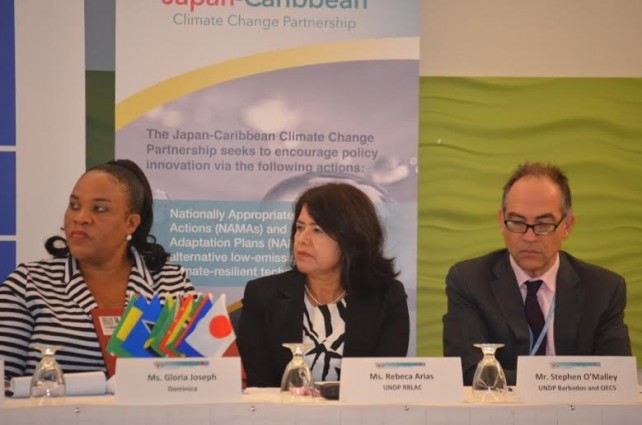
Bridgetown, Barbados, 28 January, 2016– The Government of Japan and the United Nations Development Programme (UNDP) launched the US$15 million Japan-Caribbean Climate Change Partnership (J-CCCP) today, in line with the Paris Agreement on Climate Change, to keep global warming below 2 degrees Celsius and to drive efforts to limit the temperature increase even further to 1.5 degrees Celsius above pre-industrial levels.
The launch follows a two-day meeting with more than 40 representatives from eight Caribbean countries, including government officials, technical advisors, NGO and UN partners to set out a roadmap to mitigate and adapt to climate change, in line with countries’ long-term strategies. The new initiative will help put in practice Caribbean countries’ actions and policies to reduce greenhouse as emissions and adapt to climate change, such as Nationally Appropriate Mitigation Actions (NAMAs) and National Adaptation Plans (NAPs). It will also boost access to sustainable energy and help reduce fossil fuel imports and dependence, setting the region on a low-emission development path, while addressing critical balance of payments constraints.
“The Government of Japan is pleased to partner with UNDP. It is envisaged that the project will also contribute to building a platform for information sharing in developing and implementing climate change policies and promoting the transfer of adaptation and mitigation technologies. Japan expects, through pilot projects and information sharing, the project will enable the Caribbean countries to enhance their capacity to cope with climate change and natural disasters,” said Masatoshi Sato, Minister-Counsellor and Deputy Head of Mission at the Embassy of Japan in Trinidad and Tobago, stressing that the partnership will also promote South-South and North-South cooperation, including study tours to Japan for government officials and technical advisors.
Participating countries include Belize, the Commonwealth of Dominica, Grenada, the Republic of Guyana, Jamaica, Saint Lucia, Saint Vincent and the Grenadines, the Republic of Suriname, benefitting an estimated 200,000 women and men in 50 communities.
“This partnership comes at a critical time in our nation’s sustainable development programme,” said Gloria Joseph, Permanent Secretary in the Ministry of Planning, Economic Development and Investment in Dominica. “Dominica has experienced firsthand the devastating and crippling effect that climate change can have on a nation’s people, their livelihoods and economy, risking losing up to 90 percent of Gross Domestic Product (GDP) due to a tropical storm or hurricane. Dominica stands ready and welcomes the opportunity to benefit from early response warning systems, climate change adaptation and disaster risk reduction measures as it seeks to restore and ‘build back better’.”
Climate change is recognised as one of the most serious challenges to the Caribbean. With the likelihood that climate change will exacerbate the frequency and intensity of the yearly hurricane season, comprehensive measures are needed to protect at-risk communities. Boosting resilience is crucial for the region’s development and is a clear part of UNDP’s global strategic plan of programme priorities. Negative impacts on land, water resources and biodiversity associated with climate change have also been predicted with the potential to affect shoreline stability, the health of coastal and marine ecosystems and private property, as well as ecosystem services. Increasing coastal erosion and severe coral reef bleaching events are already evident in some locations.
“UNDP has been championing the cause of climate change in the Caribbean for many years and we are pleased to partner with the Government of Japan toward the implementation of climate change projects in eight Caribbean countries,” said Rebeca Arias, Regional Hub Director for UNDP’s Bureau for Latin America and the Caribbean. “In light of the COP21 agreement, these projects are timely in assisting countries to respond more effectively to the impacts of climate change and to increase their resilience through actions today to make them stronger for tomorrow.”

or better yet use solar energy, free and clean solar energy
You really think money is going to do the job. Stop fooling ourselves. Man was the centre of the entire creation. When he fell, everything went down with him. if anything has to be fixed first, then it’s the man. The only one who can fix man is the Lord Jesus Christ. Then and only then can man fix this planet.
Oil is not a fossil fuel. It is like water. Stop being a brain dead sheep and understand the scale of the deception.
Yes MR phd
But we would reduce our imports also and generate additional revenue!
What are you talking about! Are you some sort of Kook? Oil is formed by the decay and compression of organic material (ancient plants and animals) hence the name fossil fuel. Water is an inorganic, naturally occurring molecule that have existed on earth way before life appeared.
Scammers!
They need to sponsor Our geothermal plant in order to stop depending on fossil fuel to generate 70% of our electricity.
If they assist with that we can then assist neighbouring countries by reducing their fossil fuels dependency by selling electricity to them.
And that my friends will be a win-win.